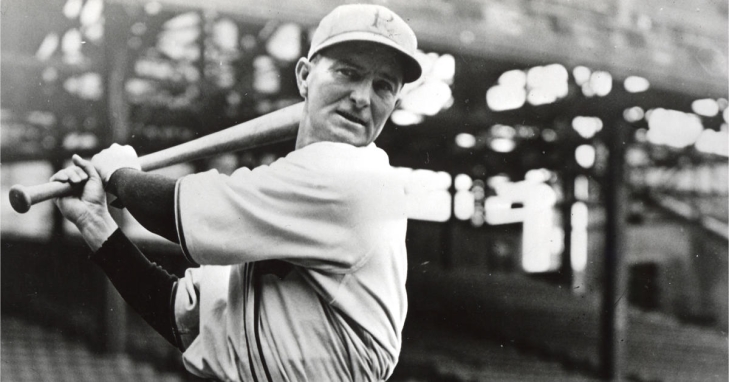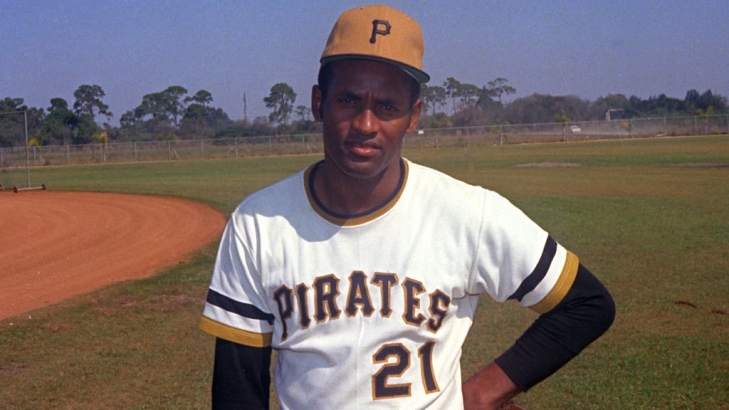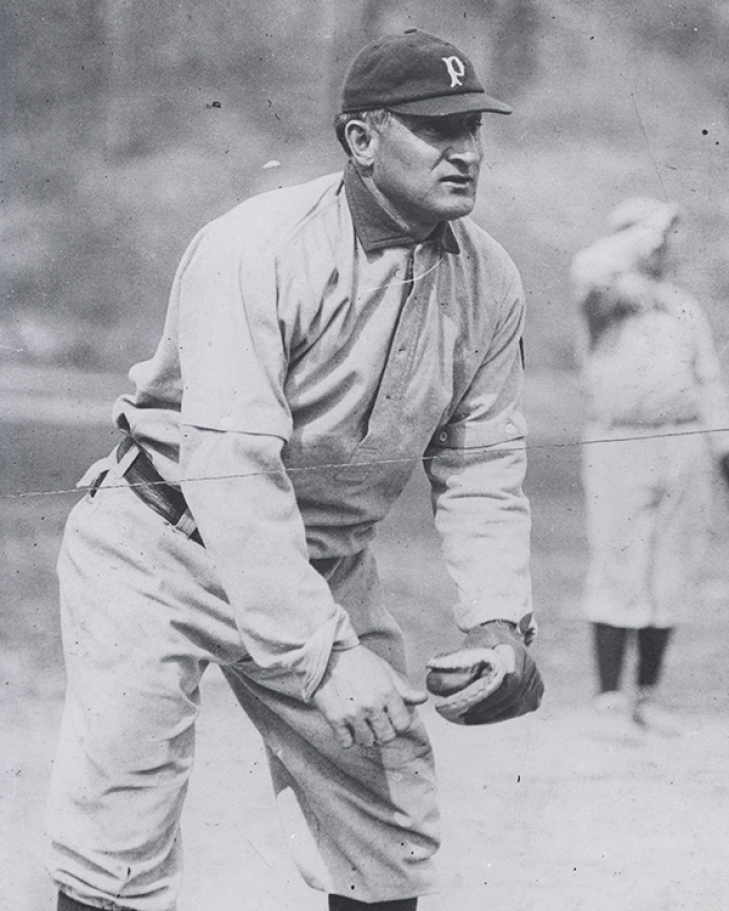
Committee Chairman
3. Paul Waner
The 1920s brought us the Home Run era that we still enjoy today, but spray hitters have never gone out of style. One of the best was Paul Waner.
Waner learned how to bat by hitting corncobs from Oklahoma, but that is not the most unique part about developing his skills. Waner had poor eyesight, specifically due to astigmatism, and he learned how to hit the blurry baseballs in the middle. Unique as it was, it worked, and he tore it up in the Minors and would land a job in Pittsburgh in 1926 as their Rightfielder.
Waner had a terrific rookie year, leading the NL in Triples (22) with a .336 Batting Average. As an MLB sophomore, Waner had his best year as a professional, topping the league in Hits (237), Triples (18), RBIs (131), and Batting Average (.380). Waner rightfully won the MVP, and although we will argue this was his peak campaign, it was not his last excellent one.
Over the next ten years, Waner could be counted on to produce Hits, Runs, and a high Batting Average. From his rookie year in '26 until 1937, Waner never finished a year with a Batting Average lower than .300, and he won two more Batting Titles (1934 & 1936) to add to the one he captured when he was an MVP. Waner had nine years with over 100 Runs (including two league-leading years), was a two-time Hit leader, and two-time leader in Doubles. He never did capture a second MVP, but he was in the top five three times.
As Waner got older, his skills slipped, and the Pirates traded him to Brooklyn during the 1940 Season. He played five more years, but had he never played baseball after Pittsburgh, Waner would have been Cooperstown-worthy. With the Pirates, he had 2,868 Hits, with a Batting Average of .340.
Waner was chosen for the Baseball Hall of Fame in 1952, his seventh year on the ballot.
2. Roberto Clemente
If there were going to be anyone who would have supplanted Honus Wagner as the greatest Pittsburgh Pirate of all time, it would have been Roberto Clemente.
The Pirates did not discover Clemente, as he was signed initially by the Brooklyn Dodgers. The Pirates plucked him in 1954 via the Rule 5 Draft, and he played all 18 of his MLB seasons in Pittsburgh. Capturing the starting Rightfield job as a rookie, Clemente blossomed into a star and was one of the top Outfielders in baseball throughout the 1960s. From 1960 to 1967, the Puerto Rican was a perennial All-Star, and he began a new streak in 1969, with four more appearances. He would take the Pirates to a World Series win in 1961, and he would have the first of four Batting Titles, with the others coming in 1964, 1965, and 1967. Finishing in the top ten in MVP voting eight times, he won the coveted trophy in 1966; in a year, he batted .317 with a career-high 29 Home Runs and 119 RBIs.
Clemente was as good with his glove as he was with his bat. From 1961 to 1972, Clemente was a Gold Glove winner, and he was a four-time league leader in Total Zone Runs. The Pirates won it all again in 1971, mainly because of Clemente, making him a two-time champion.
By the end of the 1972 season, Clemente accumulated an even 3,000 Hits (a franchise record) with 240 Home Runs and 1,305 RBIs, and a Slash Line of .317/.359/.475. It should have been more.
On December 31, 1972, he died in a plane crash while on route to deliver aid to earthquake victims in Nicaragua.
Following his death, the Baseball Hall of Fame waived the five-year wait, and he was inducted into the Class of 1973, and the Pirates retired his number 21 the same year. He is considered by many to be the most important Hispanic athlete in American history.
How To Make the Most of Sports Betting in New Jersey
Since New Jersey won a Supreme Court case that allowed sports betting to become legal, the state has enjoyed one of the most thriving sports betting industries. As the first state, New Jersey surpassed 1 billion dollars in sports betting in September 2021 and the market shows no signs of slowing down.
If you are living in New Jersey or will be paying the state a visit, then you might be curious about what options you have if you want to bet on sport, and how you make the most of them.
Betting in-person or via online sites
In New Jersey you can either place a bet in person at specific sports betting sites throughout the state, or you can download and use online sports betting apps on your laptop, smartphone or tablet. The latter has become the preferred option for many as it’s much more convenient and often comes with great perks like welcome offers and ongoing promotions. Before you get started, find out how betting in New Jersey works so you know how to read the odds and make the best decisions.
Watch games in person
When you ask most sports gamblers why they bet, it’s rarely the money that comes first. The joy of sport takes first place and sports betting is often seen as a way of enhancing the experience. Let’s say you love basketball and follow NBA games on a regular basis, then you get much more out of it by watching a game in person, especially if you have placed bets. It makes it more thrilling and exciting. Besides, you get to speak with other fans and assess the players’ skills first-hand.
Be a part of a sports community
It’s more fun sharing your interest with other people, especially when it’s to do with sport. That’s why you get much more out of sports betting in New Jersey by teaming up with others. Get talking about it, share strategies and tactics and be part of the journey together. If your friends are all on board, it is a fun activity for your next weekend getaway as you can combine it with watching sport. Not bad.
Approach it like a professional
Sports betting is about luck, but it is mostly about skill. To be good at it, you need to be able to predict outcomes and results, and that often requires research and in-depth knowledge of the sport you are betting on. If baseball is your thing, then find out how the players are ranking. Who is best and are there any newcomers that will change things up? It’s all about research, getting to know the jargon and following the latest odds.
Remember to have fun
You must never lose sight of why you are betting on sports: Because it’s fun. Don’t let the dream of winning money overshadow the enjoyment you get from watching the sport. Having fun makes sports betting a more pleasurable experience – and you have better chances of winning too as you are less likely to make rushed and ill-informed decisions.
1. Honus Wagner
Honus Wagner is not just the man on the most elusive and most valuable baseball card in history; he is also the best player in Pittsburgh Pirates history.
Playing his first three years with the Louisville Colonels, Wagner was dealt to Pittsburgh as part of the firesale that saw the end of the Colonel's existence. Wagner would play for 17 years in Pittsburgh, and the case can be made that he was the top man in the first decade of the 1900s.
Wagner won the National League Batting Title in 1900, and he set the tone for the decade, leading the NL in Batting Average seven more times, which is a record that he still holds today. “The Flying Dutchman” did everything, and history is even kinder with a look through sabermetric eyes. Wagner led the NL in bWAR 11 times, and from 1900 to 1912, he never finished lower than third.
The 1900s were in the heart of the deadball era, but Wagner was a top slugger in the decade, leading the NL in Slugging Percentage six times and OPS eight times in his career. Wagner was also an excellent baserunner, leading the NL in Stolen Bases five times, and is tenth all-time in that stat (723). Defensively, Wagner was incredible and would have been a multi-time Gold Glove winner had that award existed.
Wagner was also a champion, leading the Pirates to a World Series win in 1909, the first in franchise history. He played until 1917, and is the all-time team leader in bWAR (120.1), Runs Scored (1,521), and Triples (232).
Wagner entered the Baseball Hall of Fame in 1936 as part of the first-ever class, and the Pirates retired his number 55 in 1956





